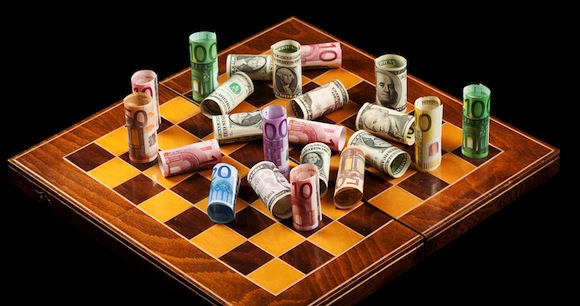Collateral damage from the currency wars in Europe, Japan and Russia could topple political leaders, put banks out of business and homeowners on the street. It can also play havoc with a portfolio. That is why The Gold Report called Mauldin Economics founder John Mauldin to ask how can readers protect themselves and perhaps even prosper.

The Gold Report:Â The beginning of 2015 has been volatile for global currencies, not the least of which was the Swiss National Bank removing its cap on the franc versus the euro. What precipitated that and what does it mean for the Swiss franc versus other currencies going forward?
John Mauldin:Â The Swiss National Bank had already expanded its balance sheet to 80% of GDP to maintain the link and would have had to buy more euros if the joint currency continued to weaken. It would be similar to the U.S. Federal Reserve having a balance sheet of $13 trillion. As late as the week before the big move, the chairman and vice chairman of the Swiss National Bank announced publicly that the peg was a cornerstone and the bank would continue to maintain it. Once it became clear that some very serious quantitative easing (QE) was coming from the European Central Bank (ECB), everything changed.
Now we see that European bond buying could be on the order of €1.1 trillion, which is a relatively serious amount, and it is open ended with €60 billion a month planned until inflation hits 2%. Given all the deflationary pressures in Europe, that could be quite a long time. Consider that Japan has had massive quantitative easing for decades off and on and its nominal GDP is roughly where it was 25 years ago. The country hasn’t witnessed anything that looks like inflation, so it’s not clear to me that the move by Europe is going to be able to create inflation.
The Swiss National Bank saw this reality and concluded it could be facing another $150 billion in losses and balance sheet expansion. There is only so much pain a central bank can handle. So it walked away from the whole euro mess. And it shocked the markets because Swiss financial leaders didn’t want to start warning people and have it leak out. They decided to get over it and deal with getting taken off the Christmas card lists later.
TGR:Â Is this just the beginning of the financial moves by the Swiss?
JM:Â Switzerland already lowered key interest rates and has indicated it is willing to do it again. It wouldn’t surprise me if we see a 1.5% or 2% negative factor in the future as the country puts a “you are not welcome here” mat out. Basically, it is charging you to hold Swiss francs.
If you’re a Russian that makes a lot of sense. You can lose 75 basis points on your Swiss franc or 25–30% on your Russian ruble. Swiss francs are better than euros and dollars aren’t available.
Other countries could follow. Denmark lowered its interest rates further into negative territory after the ECB announcement, and then lowered them again the next day. The Danes don’t want the krone to become the next currency that everybody piles into. Negative rates have arrived in about six countries now in Europe—negative out into the four-to-five-year bond range. Europe is just upside down. It doesn’t make any sense.

